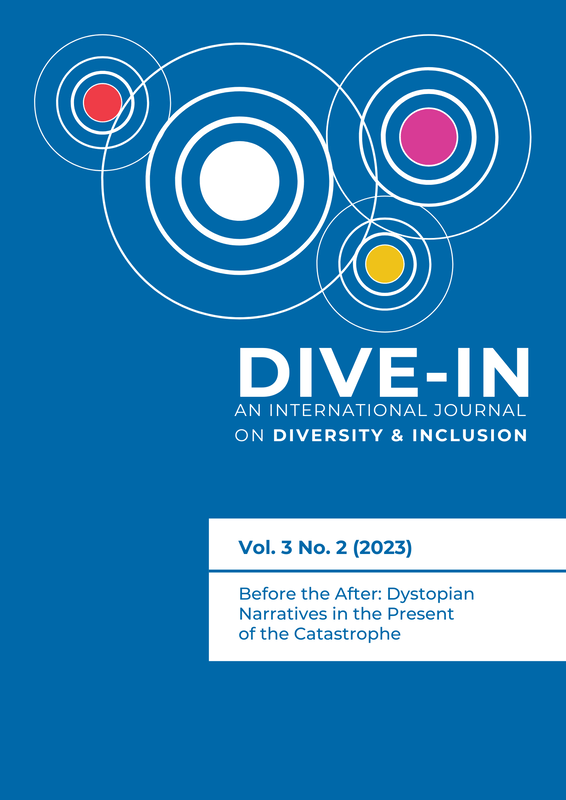Se il Mare del Nord arriva e l’Olanda scompare. L’ecofiction di Eva Meijer
DOI:
https://doi.org/10.6092/issn.2785-3233/19135Keywords:
ecofiction, Eva Meijer, nonhuman agency, response-ability, ecocriticism, Dutch literatureAbstract
In the uchronic novel with dystopian/(post)apocalyptic features Zee Nu (Sea Now) by Dutch philosopher Eva Meijer (2022) the Netherlands is submerged by an exceptional high tide that does not recede. The government reacts slowly and inadequately: the country is flooded and the surviving Dutch become climate refugees in Germany and Belgium. A scientist, an activist and a young writer embark on a boat (later on, with a dog too) in order to uncover the causes of this extreme phenomenon and to pay tribute to dead people, animals and to the devastated ecosystems. In this article I focus on how the novel fictionalizes environmental issues and foregrounds key issues of contemporary philosophers of the Anthropocene as Bruno Latour and Donna Haraway: the relationship between human and nonhuman, the agency of nonhuman and the ethics of response-ability.
References
Agamben, Giorgio. 2002. L’aperto. L’uomo e l’animale. Torino: Bollati Boringhieri.
Armiero, Marco. 2022. L’era degli scarti. Cronaca dal Wasteocene, la discarica globale. Trad. Maria Lorenza Chiesara. Torino: Einaudi.
Berendse, Martin & Paul Brood. 2022. Historische Wateratlas NL. De drijvende kracht van Nederland. Zwolle: WBOOKS.
Claeys, Gregory. 2017. Dystopia. A Natural History. Oxford: Oxford University Press.
Deen, Mathijs. 2013. De wadden. Een geschiedenis. Amsterdam: Thomas Rap.
Derrida, Jacques. 2006. L’animale che dunque sono. Trad. It. Massimo Zannini. Milano: Jaca Book.
De Vries, Joost. 2021. De gelukkigste man van Nederland. Amsterdam: Prometheus.
Franzen, Jonathan 2023. “E se smettessimo di fingere?” In Niccolo Scaffai (ed.), Racconti del pianeta Terra, 297–305. Trad. It. Silvia Pareschi. Torino: Einaudi.
Gooley, Tristan. 2016. How to Read Water. Clues and Patterns from Puddles to the Sea. London: Sceptre.
Haraway, Donna. 2020. Chthulucene. Sopravvivere su un pianeta infetto. Trad. Claudia Durastanti & Clara Ciccioni. Roma: Nero.
Jensen, Lotte. 2022. Wij en het water. Een Nederlandse geschiedenis. Amsterdam: De Bezige Bij.
Kinsky, Esther. 2023. Rombo. Trad. It. Silvia Albesano. Milano: Iperborea.
Latour, Bruno. 2020. La sfida di Gaia. Il nuovo regime climatico. Trad. It. Donatella Caristina. Milano: Meltemi.
Latour, Bruno. 2022. Dove sono? Lezioni di filosofia per un pianeta che cambia. Trad. Simona Mambrini. Torino: Einaudi.
Malvestio, Marco. 2021. Raccontare la fine del mondo. Fantascienza e Antropocene. Roma: nottetempo.
Malvestio, Marco. 2022. “Theorizing Eco-Dystopia: Science Fiction, the Anthropocene, and the Limits of Catastrophic Imagery.” European Journal of Creative Practices in Cities and Landscapes 5(1), 24–38.
Maris, Virginie. 2018. La part sauvage du monde. Penser la nature dans l’Anthropocène. Paris: Seuil.
Meijer, Eva. 2019. When Animals Speak. Toward an Interspecies Democracy. New York: New York University Press.
Meijer, Eva. 2020. “In gesprek met de zee. Een pleidooi voor vloeibaar denken.” In Laura Burgers, Eva Meijers, Evanne Nowak & Ambassade van de Noordzee, De stem van de Noordzee, 55–76. Amsterdam: Boom.
Meijer, Eva. 2021a. Linguaggi animali. Trad. It. Stefano Musilli. Roma: Nottetempo.
Meijer, Eva. 2021b. Vuurduin. Aantekeningen bij een wereld die verdwijnt. Utrecht: Ten Have.
Meijer, Eva. 2022. Zee Nu. Amsterdam: Cossee.
Meijer, Eva. 2023a. “Deep Listening and Democracy: Political Listening to Fellow Citizens and Other Beings.” The Philosopher 111(1), 53–60.
Meijer, Eva. 2023b. Het witste woord. Amsterdam: Cossee.
Meijer, Eva. 2023c. Il nuovo fiume. Trad. It. Stefano Musilli. Roma: Nottetempo.
Morton, Timothy. 2019. Come un’ombra dal futuro. Per un nuovo pensiero ecologico. Trad. Liza Candidi. Sansepolcro: Aboca Edizioni.
Nicolson, Adam. 2021. Life Between the Tides. London: William Collins.
Peligra, Cristina. 2016. “Il mito della lotta contro l’acqua nella cultura e nella letteratura dei Paesi Bassi.” In Simona Cappellari, Giorgio Colombo, Franco Paris & Marco Prandoni (eds.), Quaderni del Premio Letterario Giuseppe Acerbi: Letteratura Olandese, 72–77. Castel Goffredo: Associazione Giuseppe Acerbi.
Prandoni, Marco. 2022. “A caccia delle leggi del green. L’ecopoesia di Maartje Smits.” In Marco Prandoni (ed.), Sguardo come poesia. Da Gezelle all’ecopoesia, 153–172. Bologna: I libri di Emil.
Schama, Simon. 1993. Il disagio dell’abbondanza. La cultura olandese dell’epoca d’oro. Trad. Valeria Sperti. Milano: Mondadori.
Ten Bos, René. 2014. Water. Een geofilosofische geschiedenis. Amsterdam: Boom.
Thomson, David. 1996 (1954). The People of the Sea. Edinburgh: Canongate Classics.
Van der Vaart, Rob. 2014 (2010). “Living with Water.” In Emmeline Besamusca & Jaap Verheul (eds.), Discovering the Dutch. On Culture and Society of the Netherlands, 249–259. Amsterdam: Amsterdam University Press.
Van Dis, Adriaan. 2021. Klifi. Woede in de republiek Nederland. Amsterdam: Atlas Contact.
Westerman, Frank. 2022. Dittico idraulico. Venezia, Vajont e il sorriso del salmone. Trad. It. Claudia Cozzi. Venezia: Wetlands.
Zeller, Claudia. 2023. “L’état entre retrait et retour. La bureaucratie dans la littérature néerlandophone du début du XXIe siècle”, Deshima 17.
Downloads
Published
How to Cite
Issue
Section
License
Copyright (c) 2023 Marco Prandoni

This work is licensed under a Creative Commons Attribution 4.0 International License.





